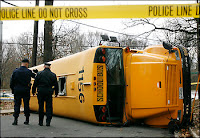And as you may know, KSN&C readers don't always agree on what's best for Kentucky's children and the future of the Commonwealth - or how we get to a better place. Usually issues get aired out in the open on the blog, but some folks, owing to their particular circumstances, feel the need to keep a lower profile - so we may chat behind the scenes.
I had one such exchange with a colleague recently over Senate Bill 1 - or more particularly - my characterization of Senate President David Williams as one who tends to defer to the constitution only when it suits his purposes.
For that, I got taken to the woodshed. Despite our fundamental agreements on student testing, I caught flack from the reader for being too hard on the Senate President.
First, the facts force me to admit that Williams deserves credit for his early support of education reform. As the Ashland Daily Independent reminded us recently,"My larger concern is the inability to create a climate in which to have a measured discussion of what we want accountability to be and how we want to assess it."
"...all ideas need to be on the table in a forum where we discuss assessment calmly not defensively, come to a consensus and then place it in the political arena. It is much too easy to criticize David Williams and Dan Kelly as anti-KERA. Richard, neither one of them are anti school reform. ...I found them both to be very thoughtful men who asked good questions and worked to understand the complex issues around assessment. Just because they dare proffer a plan that both of us, as educational professionals, may disagree with, does not make them villains. Such demonizing keeps us stuck with an assessment that does not serve the children, the teachers and parents well.
We must find a way to discuss these issues and bring a variety of views to the table so that we can improve assessment. It isn't changing the assessment that erodes reform, it is the lack of confidence in assessment that erodes our continuing efforts."
As a senator who had no leadership position in 1990, Williams courageously opposed the Republican leadership by voting for KERA. For that vote, he earned the wrath of his GOP colleagues. It took a few years for him to emerge from political exile and rise to become the most influential Republican in Frankfort.But it's true, I felt little hesitation in calling Williams out his disregard for the constitution for a few reasons: It's germane to the discussion of Senate Bill 1 and he is an attorney who understands how the constitution should function in our democracy. But, evidence suggests he has become (first and foremost) a politician with a willingness to redefine the law to suit his purposes.
It is Williams himself who has convinced me of this. Here's why: He has imagined privileges for himself that don't exist; is unrepentant in the shameful Dana Seum Stephenson affair; dumped his legislative duty to Kentucky's senior judges on the courts; ...shall I go on? It seems Senator Williams has no higher legislative priority than sustaining and adding to his own power as President of the Senate.
But my friendly critic may be correct. Perhaps it's not wise to criticize the state's most powerful Senator. "You don't tug on Superman's cape..." Perhaps we should forget the bad parts of the past in favor of the good parts and believe anew in the senate president's willingness to be involved in an open discussion of the issues. While it might be hard to convince Senator Tim Shaughnessy of this, honey may well catch more files than vinegar. I confess, my first and most natural reaction, has been to call 'em as I see 'em, and let the chips fall where they may.
Photo by Pam Spaulding in the Courier-Journal.



 This photo (from a prior year, I suspect) hardly does it justice. Imagine 500 in synchronous movement, arms waving, bodies bending, hopping, swaying and swooping through intricate routines - largely in unison - to high energy hip hop, country, pop, rock, and movie music. I was amazed.
This photo (from a prior year, I suspect) hardly does it justice. Imagine 500 in synchronous movement, arms waving, bodies bending, hopping, swaying and swooping through intricate routines - largely in unison - to high energy hip hop, country, pop, rock, and movie music. I was amazed.  You never know where those Facebook photos might show up. : )
You never know where those Facebook photos might show up. : )




